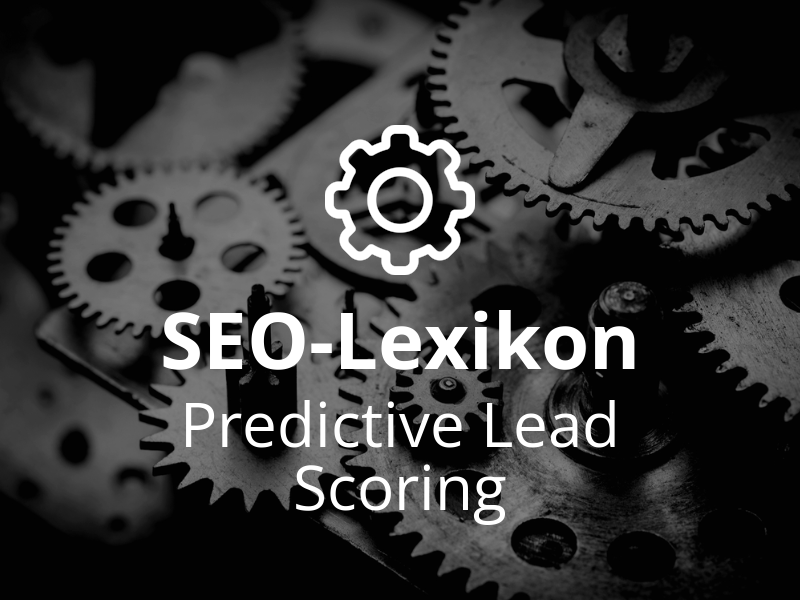What is predictive lead scoring?
Predictive Lead scoring is a technology that uses statistical models and advanced algorithms to analyze the purchase probability of potential customers. Existing customer data is automatically evaluated and assessed in order to determine the probability of a lead closing. In contrast to manual Lead scoringwhich sales employees evaluate leads on the basis of defined criteria, offers Predictive Lead scoring a data-driven method that reduces human error and increases accuracy.
The aim of Predictive Lead scoring is to determine the optimal time to hand over a lead to sales, which can significantly increase the effectiveness of marketing and sales strategies. By analyzing historical and behavioral data, companies can better assess which leads are most likely to close and deploy their resources more efficiently accordingly.
Functionality and technologies
Predictive Lead scoring uses specialized tools and functions that are often integrated into automation software. These tools collect and maintain data, which is then analyzed and updated by algorithms. The aim is to calculate a statistical probability of purchase for each customer inquiry. Mathematical models are used to predict the future behavior of leads.
The process begins with data collection and maintenance, followed by the use of algorithms to analyze this data. Both explicit and implicit information is recorded:
- Explicit information: Gender, professional situation, location
- Implicit information: Customer behavior, responsiveness to e-mails, surfing behavior
By incorporating third-party data, the algorithms can make even more precise predictions. Ultimately, the technology is used to create an accurate forecast of willingness to buy and thus increase efficiency in marketing and sales.
Advantages and challenges
Predictive Lead scoring offers numerous advantages for companies, particularly in the areas of marketing and sales. One of the greatest strengths of this method is the ability to recognize the willingness of leads to buy at first glance. This not only saves time, but also optimizes the use of resources by allowing sales staff to focus on the most promising leads. Automation replaces manual evaluation methods, resulting in more efficient data evaluation and better classification of new and existing customers.
Challenges of predictive lead scoring
Despite the numerous advantages Predictive Lead scoring also entails a number of challenges. One of the biggest challenges is the need for continuous and targeted data maintenance in order to ensure accurate and reliable predictions. As data volumes increase, manual analysis can quickly become confusing and error-prone. This is where automated and self-learning technology comes into play, enabling more comprehensive data collection and analysis.
Another risk lies in possible incorrect assumptions despite extensive data analyses. Smaller companies may find it difficult to implement and use the necessary technologies. It is therefore important that companies, regardless of their size, recognize the importance of modern technologies and make appropriate investments in order to remain competitive.
Significance for online marketing
In the area Online Marketing plays Predictive Lead scoring an essential role. Through predictive modeling and the analysis of historical and real-time data, companies can address potential customers better and in a more targeted manner. This leads to an increased conversion rate while optimizing marketing spend by relying less on guesswork and more on data-based decisions.
The ability to recognize and adjust the probability of closing leads in real time makes it possible to plan marketing-related measures more efficiently. Campaigns can be more targeted, which significantly improves overall performance. It also offers Predictive Lead scoring a personalized user experience, as the approach and the offer are specifically tailored to the needs and behavior of the lead.
Focus on efficiency and precision
Another advantage is that Predictive Lead scoring relieves the burden on marketing and sales staff by minimizing human error and at the same time increasing the precision of lead evaluation. This enables companies to monitor and optimize the performance of all their traffic sources. This not only supports the acquisition of new customers, but also the maintenance of existing customer relationships.
Predictive Lead scoring promotes the integration of CRM and marketing automation software systems, creating and continuously updating a holistic overview of the customer. This is particularly important in order to remain competitive and be able to react quickly to changes in the market.
Important factors for a predictive lead scoring model
An effective Predictive Lead scoring-model is based on a number of important factors that are carefully recorded and analyzed. Key criteria include demographic information such as gender and professional situation, as well as firmographic data such as company size and industry type. The combination of this information provides a comprehensive view of the potential customer and increases the accuracy of the predictions.
Interest data and customer activities
Another key factor is Data of interestwhich include engagement with products or services and consent to be contacted. This data provides valuable insights into the lead's interests and enables a more targeted approach. Also crucial are Customer activities such as email behavior and website interactions. Such behavioral data helps to assess the lead's current interest and future willingness to buy.
Purchase history and performance of marketing campaigns
The Purchase history is another important component of a Predictive Lead scoring-model. Past purchases, sums spent and the frequency of transactions provide important indications of the lead's future purchasing behavior. The Performance of marketing and sales campaigns also plays a decisive role. By increasing the efficiency and Range of campaigns, adjustments can be made to further optimize lead qualification.
By integrating all these factors into a well-maintained and continuously updated Predictive Lead scoring-model, more precise and efficient marketing strategies can be developed, which can promote business success in the long term.
« Back to Glossary Index

